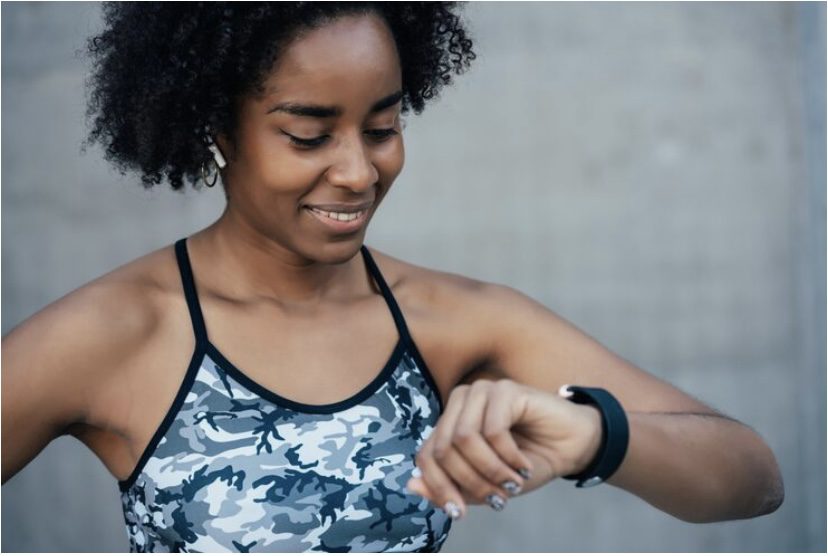This content is for informational and educational purposes only. Always consult a qualified healthcare provider.
Last Updated on August 21, 2025 by Grace Oluchi
Using fitness trackers and wearables can help a lot. Such as knowing how much physical activity we do, and monitoring our health in general.
They can help you with information on the things you do every day, like your daily habits, and they can be used to reach your fitness goals.
📋 Table of Contents
What makes using fitness trackers and wearables valuable?
The benefits of using fitness trackers are that they can help you:
Track your progress and help you keep up with daily activities, know how much sleep you’re getting, and know how much progress you make in your workouts.
Stay positive and determined, cause you’ll receive reminders and notifications (8an invisible bestie, which can give you the strength to keep going.
Also, they can help you set goals that you can achieve. Say you want to start walking 7k steps every day, using fitness trackers and wearables can help you along the way. Or you want to reach a certain level with exercise, they can help you with that, too.
Above all, the great thing about using fitness trackers and wearables is that they can keep you from guessing or being in the dark about your fitness goals.
They do help with a lot of things, and having them is worth the investment.
Key features of fitness trackers and wearables
These are the cool things you should know about them, at least you need to know what you’ll be buying.
1 . Using them can help you keep track of your daily steps and the distance you cover.
2 . They can track your heart rate and rhythm in that current moment.
3 . If you like swimming a lot, running, cycling, or doing other outdoor activities, they can help you monitor them.
Tips to know about using fitness trackers and wearables
It’s important that you know how to use them well.
The first thing is to set your goals, but they should be realistic, and then you start tracking your progress.
You’ve also got to wear it consistently, so that you can keep up with your daily activities and sleep patterns.
Also, it can be helpful to link it with your phone, laptop, or computer; sync your data with them, so you can track your progress. And, you can set new goals when you feel the need to do so.
How to make a decision when choosing the right fitness tracker or wearable
It’s not a lot. You just need to look at your fitness goals, the activities you enjoy a lot, and the features you prefer.
They are many types, so you need to look at different fitness trackers and wearables, compare things like:
- Battery life
- Accuracy
- Compatibility
It’s similar to when you want to buy a phone, you consider the things or specs you want, and then you make a decision.
Types Of Fitness Trackers And Wearables
There are different types, and they do different things, so it’s best to know what they do.
Let’s start with Basic Fitness Trackers: Examples are the Fitbit Inspire 3 and the Xiaomi Smart Band 8. They can help you track the steps you take, how much distance you cover, the calories you burn, and your heart rate.
The Advanced Fitness Trackers: They have added features like GPS, tracking how often you stress, and monitoring the way you sleep. Garmin Vivoactive 5 and Fitbit Charge 6 are good examples.
Then, GPS Fitness Trackers: Garmin Forerunner 265, Coros Apex 2, have built-in GPS. This can help with a more accurate calculation of the distance you cover when doing your outdoor activities.
Wearables
Sleep monitors: They focus on helping you monitor your sleep quality and give you ways to improve it. Examples are Whoop 5.0 and Oura ring gen 4.
Heart rate monitoring wearables: Fitbit Charge 6 and Garmin Venu 3 can track your heart rate and the pattern of your heartbeats.
Smart rings: They’re small, ring-shaped wearables that track your physical health. Some examples are Ultrahuman ring air, and Oura ring gen 4.
Smartwatches
Sports smartwatches: They’re designed for certain sports like running, cycling, or swimming. Examples are Garmin forerunner 965 and Polar ignite 3.
Apple Watch Series 10 can help monitor your blood pressure and blood sugar levels.
Samsung Galaxy Watch 7 has a mix of fitness and smartwatch abilities.
The point
Using fitness trackers and wearables can give you data, which can be helpful to understand the things you do and how you act over time. The important thing is that they encourage and help you live a healthy life, and make good lifestyle changes where necessary.
However, if wearing fitness trackers or wearables starts to increase your stress and anxiety about life…
Just take it off, stop wearing it, and sell it if you can. Your peace of mind is important.

